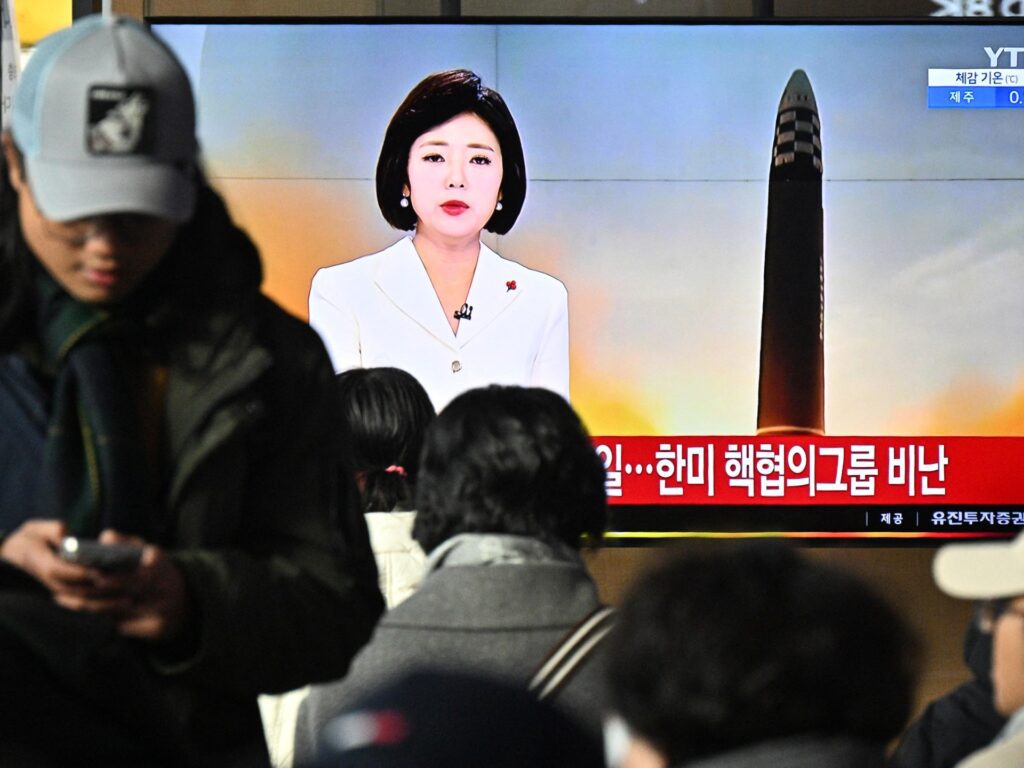North Korea has resumed missile tests in a record year. Neighboring countries have denounced the launch of a long-range ballistic missile capable of hitting the United States hours after launching a short-range weapon as a threat to international peace.
South Korea’s military said on Monday that it detected a long-range ballistic missile launched from the Pyongyang area and splashed into the East Sea, also known as the Sea of Japan, after flying 1,000 kilometers (620 miles).
Japan’s Ministry of Defense announced that it was an intercontinental ballistic missile (ICBM) with the potential to reach anywhere in the United States.
“The ICBM-class ballistic missile launched this time could have a flight distance of over 15,000 km, based on the trajectory according to the weight of the warhead.” [9,320 miles]” said Shingo Miyake, Parliamentary Vice-Minister of Defense.
South Korea said the short-range missile was fired from the Pyongyang area into the waters between the Korean peninsula and Japan, and the test took place around 10:38 p.m. (13:38 p.m. Japan time). The projectile flew approximately 570km (354 miles) before falling into the ocean.
Japanese Prime Minister Fumio Kishida convened the National Security Council and condemned the launch, calling it “not only a clear violation of United Nations Security Council resolutions, but also a threat to regional peace and stability.”
South Korea said the launch was a “serious provocation” that threatened international peace.
The successive launches came after South Korea and the United States agreed to strengthen their joint nuclear deterrent in the face of North Korea’s evolving nuclear threat. North Korea has conducted a record number of weapons tests and launched reconnaissance satellites this year as it advances Kim Jong Un’s military modernization plan.
The US military said the launch “highlighted its destabilizing effects.” [North Korea’s] Illegal Weapons Program.”
The White House said National Security Advisor Jake Sullivan met with his South Korean and Japanese counterparts and emphasized the importance of sharing missile warning data.
Meanwhile, China, North Korea’s main political and economic supporter, expressed its firm support for North Korea, although it did not mention the launch.
According to a statement from the newspaper, Foreign Minister Wang Yi told the visiting North Korean delegation, “Even in the face of the turbulent international situation, China and North Korea always firmly support and trust each other.” , demonstrating the strategic importance of friendly bilateral cooperation.” Chinese Ministry of Foreign Affairs.
Monday’s test was the fifth intercontinental ballistic missile (ICBM) tested this year and the first since the Hwasong-18 was launched in July.
The Hwasong-18, which was first tested in April, is North Korea’s first solid-fuel intercontinental ballistic missile, making it easier to transport and faster to launch than liquid-fueled missiles.
South Korea said it was analyzing whether Monday’s launch was a solid-fuel intercontinental ballistic missile (ICBM).
nuclear deterrence
The launch came two days after the United States and South Korea held the second meeting of their Nuclear Consultative Group in Washington, D.C., to discuss nuclear deterrence in the event of a conflict with North Korea.
North Korea’s Defense Ministry spokesman on Sunday condemned its allies’ plans to expand annual joint military exercises, including nuclear operations training, next year, warning it was a “preemptive and deadly counterattack.”
“This is an open declaration of nuclear confrontation to make the use of nuclear weapons against North Korea a fait accompli,” the statement carried by news agency KCNA said, using North Korea’s official acronym.
“Any attempt to use force against North Korea will be met with a pre-emptive and deadly counterattack.”
All North Korea’s ballistic missile activities are prohibited by United Nations Security Council (UNSC) resolutions, but North Korea claims they are part of its sovereign right to self-defense.
The missile launch also coincided with Pyongyang marking the anniversary of the death of leader Kim Jong Un’s father and predecessor, Kim Jong Il, who died on December 17, 2011.
North Korea last year declared itself an “irreversible” nuclear state and has repeatedly said it would never abandon its nuclear program, which the regime considers vital to survival.
Since North Korea conducted its first nuclear test in 2006, the Security Council has adopted numerous resolutions calling for an end to North Korea’s nuclear and ballistic missile programs and the imposition of crippling sanctions.
The United States and its allies have also expressed concern about increased military cooperation between North Korea and Russia, following Kim’s visit to Russia in September to meet with President Vladimir Putin.
They fear that Mr. Kim is providing desperately needed munitions to help continue the war in Ukraine in exchange for Russian technical assistance for Mr. Putin’s modernization plans.
